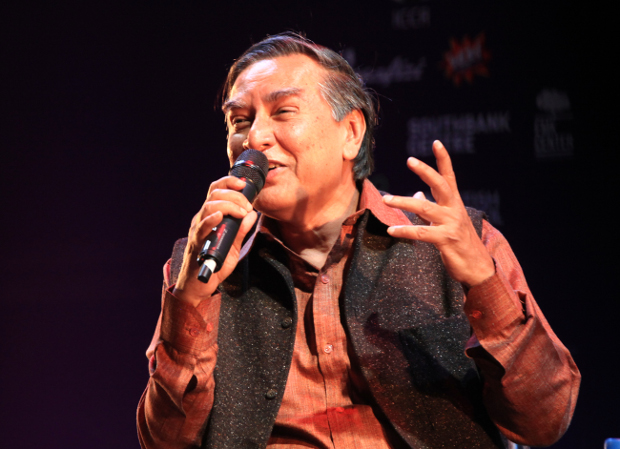Bangladesh: Editor’s Admission of Running Military-Fed Stories Triggers Debate
2016.02.05
 The front-page of the Daily Star, Bangladesh’s largest English-language newspaper, reports on the election of Sheikh Hasina (pictured) as prime minister, Dec. 30, 2008.
The front-page of the Daily Star, Bangladesh’s largest English-language newspaper, reports on the election of Sheikh Hasina (pictured) as prime minister, Dec. 30, 2008.
The prime minister’s son Friday called for the arrest of the editor of Bangladesh’s largest English-language daily after the editor publicly confessed that the newspaper had printed unsubstantiated and military-fed allegations against his mother nine years ago.
Daily Star editor Mahfuz Anam this week told TV talk show News Night Xtra that army intelligence officials had prodded the paper to publish articles containing allegations of corruption against top politicians in 2007 and 2008, when a military-installed caretaker government ruled Bangladesh.
The Daily Star, which celebrated its 25th anniversary on Friday, was among many Bangladeshi news outlets that printed lists with names of people who were allegedly corrupt, but Anam’s admission is unprecedented. It has unleashed a spirited debate about journalistic integrity in the country.
Among those named in the lists were Sheikh Hasina, the current prime minister, as well as Khaleda Zia, a former prime minister, leader of the opposition Bangladesh Nationalist Party (BNP) and Hasina’s foe.
“Mahfuz Anam … has admitted he published false corruption stories against my mother … to defame her. He did this in support of a military dictatorship in an attempt to remove my mother from politics,” Sajeeb Wazed, Hasina’s son, said in a message posted on Facebook.
“The editor of a major newspaper running a false smear campaign to assist in a military coup is treason,” Wazed added, saying Anam to this day publishes articles accusing politicians of being unethical and corrupt.
Wazed then branded Anam as “completely unethical and a liar.”
“He certainly has no right to remain a journalist, let alone an editor,” Wazed went on to say, accusing the editor of running false stories that, as he put it, led to his mother’s arrest and 11-month detention.
“I demand justice,” the PM’s son said. “I want Mahfuz Anam behind bars and on trial for treason.”
Anam (pictured below) declined an interview request from BenarNews to speak about his televised admission, which has caused a sensation.

No other editors of large news outlets that were believed to have carried unsubstantiated content, fed to them by Bangladesh’s Directorate General of Forces Intelligence (DGFI), have yet to follow suit with similar admissions.
“This is a great mistake in my journalistic career, as an editor; I admit this,” Anam said during the program that aired Wednesday night on ATN News, a privately owned satellite-based station.
Interregnum
A caretaker government ruled Bangladesh from January 2007 to December 2008, when Sheikh Hasina of the Awami League (AL) party was elected prime minister.
On Jan. 11, 2007, the caretaker government took over the country with the military’s backing, when President Iajuddin Ahmed declared a state of emergency following months of street fighting between supporters of the BNP and Awami over preparations for the country’s ninth general election.
Between October 2001 and October 2006, the Awami League led a parliamentary bloc in opposition to Khaleda Zia, who was then prime minister. In October 2006, Zia’s government stepped aside to make room for a caretaker government.
As stipulated then by the Bangladeshi constitution, an incumbent party had to vacate office and let a non-partisan caretaker administration govern the country during the electoral period. But the first caretaker government stayed in power for two months and was replaced by a military-backed one, because it was seen as biased toward the BNP.
Several days after the new caretaker government was installed, the Daily Star and its sister publication, the Prothom Alo – the country’s best-selling Bangla daily – published lists of allegedly corrupt people, and Hasina, her party’s secretary and her cousin were arrested.
Trust eroded?
Anam’s admission so many years later has drawn mixed reactions.
Journalist Tasneem Khalil, a former staffer at the Daily Star, defended Anam against Sajeeb Wazed’s call for his arrest.
“I can understand that Wazed is writing from a deep sense of injustice, when he writes that those DGFI-planted stories facilitated his mother’s imprisonment for eleven months. I, however, cannot agree with his demand that Mahfuz Anam be sent ‘behind bars’ and tried ‘for treason,’” Khalil said in comments posted online.
“If editors (and journalists) are to be sent behind bars for publishing DGFI-planted stories, then, I am afraid, the AL government will have to round up at least a thousand people from Dhaka alone,” said Khalil who, in praising Anam for telling the truth, noted that he had differences of opinion with his former boss.
Shameem Ara Sheuli, who heads the department of media and mass communication at the American International University of Bangladesh, thanked the Daily Star editor for his admission.
“He (Mahfuz Anam) has the courage to admit his mistakes. We should praise him. You have to remember that media cannot function independently in case a government is repressive,” Sheuli told BenarNews.
But Toufique Imrose Khalidi, editor-in-chief of Bangladesh’s first online news site, bdnews24.com, and a former editor at the Daily Star, criticized Anam.
The paper could have resisted pressure from army intelligence to publish dubious content because the Daily Star’s financial standing nine years ago was “very strong,” Khalidi said.
“After such an admission, Mr. Mahfuz Anam, has lost his moral authority as an editor,” he told BenarNews.
Arshad Siddiqui, a free speech activist, described Anam’s past action and his admission this week as a setback for the integrity of the press in Bangladesh.
“His statement will surely erode the public trust on media,” Siddiqui said.







